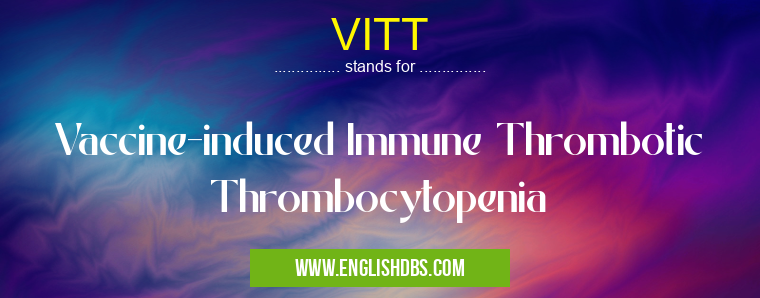What does VITT mean in DISEASES
Vaccine-induced Immune Thrombotic Thrombocytopenia (VITT) is a rare but serious blood clotting condition that can occur after vaccination with certain types of COVID-19 vaccines. VITT is characterized by the formation of blood clots in unusual locations, such as the brain, abdomen, or legs, and a low platelet count (thrombocytopenia).

VITT meaning in Diseases in Medical
VITT mostly used in an acronym Diseases in Category Medical that means Vaccine-induced Immune Thrombotic Thrombocytopenia
Shorthand: VITT,
Full Form: Vaccine-induced Immune Thrombotic Thrombocytopenia
For more information of "Vaccine-induced Immune Thrombotic Thrombocytopenia", see the section below.
What is VITT?
VITT is a condition that occurs when the immune system reacts abnormally to a COVID-19 vaccine, specifically those that use a viral vector (such as AstraZeneca and Johnson & Johnson) or an mRNA platform (such as Pfizer-BioNTech and Moderna). This reaction leads to the production of antibodies that activate platelets and cause them to clump together, forming blood clots.
Symptoms of VITT
The symptoms of VITT can develop within 5-30 days after vaccination and may include:
- Severe headache
- Blurred vision
- Double vision
- Seizures
- Weakness or numbness in the arms or legs
- Nausea and vomiting
- Abdominal pain
- Shortness of breath
Diagnosis of VITT
Diagnosis of VITT is made based on a combination of symptoms, laboratory tests, and imaging studies. Blood tests will show a low platelet count and may also show evidence of blood clots. Imaging studies, such as CT scans or MRI scans, can help to identify the location of the blood clots.
Treatment of VITT
Treatment for VITT typically involves the use of anticoagulants to prevent further blood clots from forming. Platelet transfusions may also be necessary to increase the platelet count. In some cases, surgery may be necessary to remove a blood clot that has formed in a critical location.
Essential Questions and Answers on Vaccine-induced Immune Thrombotic Thrombocytopenia in "MEDICAL»DISEASES"
What is Vaccine-induced Immune Thrombotic Thrombocytopenia (VITT)?
VITT is a rare but serious condition that can occur after receiving certain types of COVID-19 vaccines. It involves the formation of blood clots in the arteries, combined with a low platelet count (thrombocytopenia).
Which COVID-19 vaccines are linked to VITT?
VITT has been primarily associated with the AstraZeneca (Vaxzevria) and Johnson & Johnson/Janssen vaccines. It is not currently a known risk with the Pfizer-BioNTech or Moderna vaccines.
What are the symptoms of VITT?
Symptoms typically develop within 4-20 days after vaccination and may include:
- Severe headache that does not improve with regular pain medication
- Blurred vision or other vision problems
- Shortness of breath
- Chest pain
- Leg swelling or pain
- Abdominal pain
- Nausea and vomiting
How is VITT diagnosed?
Diagnosis involves a combination of symptoms, laboratory tests to detect low platelet count and elevated D-dimer levels (a marker of blood clotting), and imaging tests to locate blood clots.
How is VITT treated?
Treatment typically involves:
- Intravenous immunoglobulin (IVIG) to suppress the immune system
- Platelet transfusions to increase platelet levels
- Anticoagulants (blood thinners) to prevent further clotting
What is the prognosis for VITT?
With prompt diagnosis and treatment, the majority of people with VITT recover fully. However, in severe cases, complications such as stroke, heart attack, or thrombosis in the brain can occur.
How can I prevent VITT?
The best way to prevent VITT is to get vaccinated against COVID-19. The risk of VITT is extremely rare, and the benefits of vaccination far outweigh the potential risks.
Final Words: VITT is a rare but serious condition that can occur after vaccination with certain types of COVID-19 vaccines. It is important to be aware of the symptoms of VITT and to seek medical attention promptly if you experience any of these symptoms after vaccination. Early diagnosis and treatment of VITT can improve the chances of a successful recovery.
